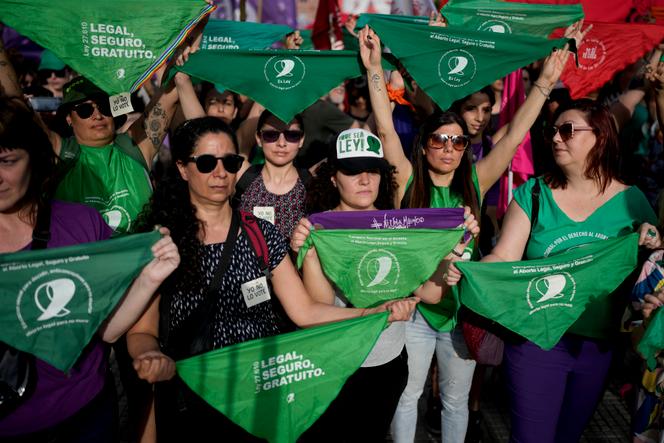


Around a hundred women, transgender, and non-binary people gathered on Wednesday, March 6 on the patio of the Hotel Hector Quagliaro in Buenos Aires, loaned by the ATE civil servants' union. On the wall hangs a green banner from the "Campaign for Legal Abortion." Trade unionists, representatives of neighborhood assemblies, the working classes, indigenous peoples, and the Afro community – all answered the call to prepare for International Women's Day.
Libertarian and conservative president Javier Milei has been in office since December 10, 2023, and Argentinian feminism seems to be finally waking up. With two days before the March 8 mobilization, the latest preparatory meeting is fine-tuning the details. One committee is reviewing the march to circumvent the order aimed at obstructing demonstrations, implemented by Minister of Security Patricia Bullrich as soon as she took office; another is busy drafting the text to be read on the Plaza del Congreso in Buenos Aires. Discussions were heated, but the assembly agreed to show a united front in the face of the austerity policies pursued by Milei, and his assaults on the achievements of the feminist and LGBT movements.
"We haven't seen so many people at these meetings since 2018," applauded sociologist Luci Cavallero, one of the representatives of the Ni Una Menos ("Not one woman less") collective. "They've served as a space to highlight the conflicts emerging as a consequence of the government's policies."
Active for decades, the Argentine feminist movement had become a benchmark in Latin America after the first massive Ni Una Menos demonstration against femicides on June 3, 2015. In the aftermath, Argentinian women won the adoption of public policies against gender violence, then the legalization of abortion in December 2020, during the Covid-19 pandemic, thanks to street demonstrations.
Paradoxically, this epic battle also marked an inflection point in the country's feminist dynamic. "Once abortion had been legalized, the question of the 'day after' arose. How can we find common ground when the feminist movement is so heterogeneous?" demanded Renata Heller, a political scientist at the University of Patagonia and adviser to the National Council for Scientific and Technical Research (Conicet). Milei's election may have helped them out of this dilemma.
Earlier in the day, to mark the start of the new school year, the Argentine president gave a speech at his former high school, the Cardenal Copello College, a private Catholic school in Buenos Aires. In front of an auditorium packed with teenagers, he talked about "assassins in green scarves," the symbol of the fight to legalize abortion in Argentina, declaring "For me, abortion is murder aggravated by the connection."
You have 45.1% of this article left to read. The rest is for subscribers only.
